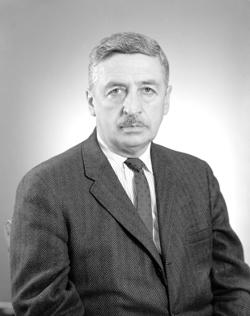 Director of the Geological Survey of Canada who pioneered modern geological study of the Arctic Islands.
Director of the Geological Survey of Canada who pioneered modern geological study of the Arctic Islands.
Yves Fortier, former Director of the Geological Survey of Canada, was born in Quebec City on 17 August 1914, two weeks after Germany declared war on France at the outbreak of World War I. He died in Ottawa exactly 100 years later, on 19 August 2014.
Yves obtained a B.A. from Laval University in 1936, a B.Sc. in Geology from Queen’s University, Kingston, in 1940, and an M.Sc. from McGill University in 1941. His service with the Geological Survey of Canada (GSC) began in 1943 with fieldwork in the Yellowknife area. A mapping project in the Appalachians of southeastern Quebec led to conferral of a Ph.D. by Stanford University in 1946.
Yves was introduced to the Arctic in 1947 when he accompanied a team of geophysicists investigating Earth’s magnetic field in the Arctic Islands using a Canso amphibious aircraft. The excellent exposure of bedrock in the treeless terrain made a deep impression on Yves.
After spending the summer of 1949 in gneisses of southern Baffin Island, using boats along the coast and pack dogs on land, Yves proposed a circumnavigation by canoe of Cornwallis Island, lying in the central part of the Arctic Islands and underlain entirely by sedimentary rock. This was accomplished in 1950 in the space of one month by Yves, Raymond Thorsteinsson and Trevor Harwood in a 7 m freighter canoe powered by a 5 hp outboard motor.
Responding to a request by the federal Department of Indian and Northern Affairs that GSC “establish further the petroleum potential” of the predominantly sedimentary northern Arctic Islands, in the winter of 1953-54 Yves began planning a reconnaissance survey of the geologically little known Queen Elizabeth Islands, to take place in 1955. Operation Franklin, organised and led by Yves, involved 11 geologists and their support personnel, who began fieldwork in May and ended it in late September 1955. During the spring, supplies were cached at various points by ski/wheel-equipped aircraft and some geological work was done by dog-sledging. In the summer, field parties were supported – for the first time in the High Arctic – by helicopter. Results from this vast area initiated an oil and gas exploration rush in the1960s.
After occupying senior scientific managerial positions within GSC in the period 1958-64, Yves became the 13th and first francophone Director of the organisation in 1964, a position he held until 1973. Yves ended his career as Assistant Deputy Minister for Science and Technology in the Department of Energy, Mines and Resources and retired in 1976.
Yves was a founding member of the Geological Association of Canada, a Fellow of the Royal Society of Canada, and an Officer of the Order of Canada; held honorary membership in The Geological Society (London) and Société géologique de France; and was awarded the Massey Medal by the Royal Canadian Geographical Society and the Logan Medal by the Geological Association of Canada. The mineral yofortierite was named in his honour.
Yves is survived by his wife Trudy, two sons and two daughters.
Thomas Frisch